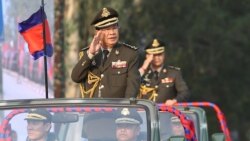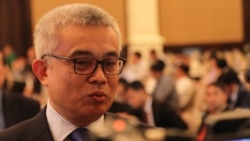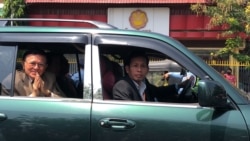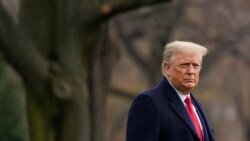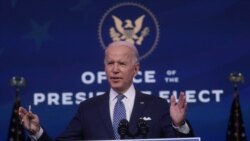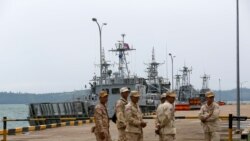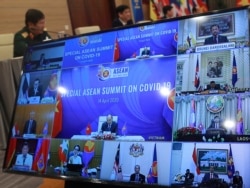Editor's Note: U.S. Ambassador to Cambodia W. Patrick Murphy sat down with VOA Khmer’s Aun Chhengpor for an interview about the state of democracy and human rights in Cambodia. He said that Cambodia’s fledgling democracy has been eroded recently and that he urged Prime Minister Hun Sen’s government to “do just the opposite.” He also discussed U.S. intent to assist Cambodia’s 2022 chairmanship of ASEAN, as well as other long-standing issues of deportations and debt taken during the Lon Nol regime.
VOA Khmer: In the last three years, the principal opposition party is now dissolved, its leaders either got arrested, fled the country into exile, or are banned from politics. And now we get a one-party parliament or government that never ceases arresting critics, journalists, netizens, and most lately there is a massive trial against at least 137 opposition members and supporters. By the time we are speaking, is Cambodia still a democracy?
Ambassador Murphy: Well, you know, this month we are shining a spotlight on democracy and human rights here in Cambodia as part of the relationship; a relationship that started 70 years ago when the United States recognized an independent Cambodia.
And throughout the year we focus on many areas of collaboration and partnership and I would say the same have been true for democracy and human rights especially for the last 30 years starting with the Paris Peace Process, in which the United States was a signatory working with Cambodia and seventeen other countries.
That led to process that revealed the Constitution and a framework for a democratic Cambodia. And there have been a lot of progress. And I think Cambodians can appreciate that democracy delivers prosperity, stability, peace, and harmony. And there have been a lot of that over the last thirty years in Cambodia.
You point to a period of these last couple of years that have been of concern because there has been some rolling back of these practices and these traditions.
And we encourage, as friends of the Cambodian people and as a partner of the Kingdom of Cambodia, just the opposite: more space, more inclusivity, greater adherence to the principles and the multi-party aspects of the country’s constitution.
VOA Khmer: As a partner of Cambodia, Mr. Ambassador, do you believe that the U.S. government, and you yourself here with your team, can try or consult Cambodia to be back on the democratic track?
Ambassador Murphy: Well, we very much encourage that. We do so through our programs and activities, our public messaging, and our private messaging with the government.
I met with senior government officials here frequently and we encourage adherence to both the country’s constitution, which grants the people of Cambodia their rights and their ability to participate in political life. We also encourage and the international standards and respects of human rights, and efforts to strengthen the rule of law.
VOA Khmer: If you were meeting any non-governmental politicians, especially the grassroots activists who are now facing charges, in fear of arrests, in fear of violence, what would you say to them now?
Ambassador Murphy: Well, I say the same things I say to anybody in Cambodia. Is this kind of rolling back of democratic practices a good way to strengthen democracy? And I think we hear that answer from many that it is not. It is eroding the best practices of democracy that have been proven here in Cambodia.
There have been increasingly successful elections in the past – more inclusive and higher participation rates with many different parties. There has been vibrant civil society and a strong local media. In the last couple of years, however, we have seen some movement backward there.
What we say to people is that you should exercise your rights, you should do so responsibly and peacefully. And we say to the government, please consider ways to include more voices and to take efforts to bolster those rights that are all accorded to the citizens of the Kingdom.
VOA Khmer: Is it comfortable to you when recently the prime minister said the ruling Cambodian People’s Party is here to stay and even floated about possible successors to himself in the future, including possible candidacy of his eldest son Hun Manet and now the finance minister Aun Pornmoniroth. Are you comfortable hearing that when you are encouraging a democratic Cambodia?
Ambassador Murphy: To be honest, whether I’m comfortable or not it does not matter. I am a guest here. That question is best posed to the people of Cambodia. I think it’s important, however, to underscore that the United States does not choose sides, except the side of all Cambodian people, who have the rights to a multiparty form of governance, to the freedom of speech and assembly. We think they should be protected.
Is it good for a country that all of the seats in the legislature body are part of one single party? Or is it a better result to have multiple parties represented and different voices?
VOA Khmer: Over the past fifteen months you stay here, have you conveyed this kind of message to relevant government officials and how receptive were they?
Ambassador Murphy: Absolutely, I came here with a message of friendship and partnership. We have many programs and activities throughout Cambodia working with Cambodian people. Many are very, very successful, and helped Cambodia yield positive results in many different sectors: agriculture, environment, education, and, especially, in public health.
Our support for public health is so important now during the global pandemic and it’s been said over the years that there have been progress here with democracy and human rights, when you look at civil society, institutions, and Constitution.
The troubling part is the retrograde in the last couple of years where you see some deterioration. My message is very consistent that the most senior level of government here, as a friend, we encourage you to do just the opposite: protect the rights of your citizens, encourage many voices, bring those voices in so that they can be part of the process. You will be stronger for it.
Over the time, your gains in prosperity and stability will be more sustainable when you are enforcing and protecting those rights.
VOA Khmer: Mr. Ambassador, Mr. Kem Sokha, former opposition leader and former president of Cambodia National Rescue Party, is being tried for treason for allegedly conspiring with the U.S. to topple the Cambodian government. You yourself were present in the hearing once, shortly before it was paused due to COVID-19. Should Mr. Kem Sokha be freed and his charge be dropped? Or should his trial be resumed anytime soon?
Ambassador Murphy: Well, that question is best answered by an independent judiciary. If there is to be a process, it should be transparent and it should be in accordance with the rule of law.
I make it very clearly – publicly and privately – that any accusations of U.S. involvement are a fabrication, are false.
My president has made that clear in corresponding with the Prime Minister. Our intent in Cambodia is good. We are very transparent and we are here as friends and partners. We have no intent to interfere and we have no objective to change the government. That’s for the Cambodian people.
We are here to help and to be a good partner.
We also have our national interests. It is in the U.S. interests to share our values, our principles of democracy and respects for human rights. We encourage political leaders of all parties to be part of the process and we encourage authorities here to allow and facilitate that.
We don’t think that politically-motivated charges, lengthy detentions and trials, conspiracy theories as part of fabricated charges are necessarily the best way to strengthen the democracy. We make that very clear.
For somebody like Mr. Kem Sokha, we encourage ways to help and make him be part of the process. He has a long career of service in government and in civil society. He is a respected human rights advocate. He can contribute to Cambodians and I think he probably wants to contribute in positive ways.
VOA Khmer: Whatever you describe, is it the notion of the independent judiciary that you observe here and, in the system that Mr. Kem Sokha and the opposition leaders, activists, supporters, are facing. Is it a notion of an independent judiciary?
Ambassador Murphy: Yeah, that's another good question. I think, for the Cambodian people, this is an institution here in Cambodia.
What we can observe and you raise this as an example, when you have a mass trial of over a hundred individuals who don't understand what charges have been launched against them, where they are brought together in a process that lacks transparency, it raises some questions. What are the motivations here? Is there strong rule of law? Is there an independent judiciary?
I hear that from many voices in Cambodia who raise those kinds of questions. And I think there are legitimate credible questions. To the contrary, what we would see is helpful for Cambodia's maturation as a democracy are government-led efforts to protect rights, to ensure inclusivity of political parties, of political leaders, of civil society. Even when those voices are critical. Not everyone's happy every day with government. I can say that's very much the same in the United States. But hearing criticism and endorsing and welcoming dissent, it's an important component in a democracy.
VOA Khmer: I'd like to talk about that, too, because as you may know, and you heard the report, Mu Sochua, vice president of the opposition, is a U.S. citizen. She is pledging to lead a team of her fellow CNRP officials and leaders living in exile, returning to the country to attend a trial that you mentioned. Is the U.S. government in support of a safe return, knowing that the chance of her getting a fair and free trial is questionable?
Ambassador Murphy: Well, as you mentioned, you cite an individual who's an American citizen. I think it's a question best directed at her.
But I can share with you what we've encouraged the government here to do is to embrace voices of Cambodians, both inside the country and outside the country.
This is a country that should welcome all of its citizens -- all who identify as being Cambodian, to be part of the process.
It's regrettable that there are individuals inside the country who don't have rights to speak freely, to participate in political life. It's regrettable that some individuals are outside the country because they fled or they fear poor treatment or unfair treatment inside the country.
We encourage moves to embrace and to welcome participation of all of those voices.
VOA Khmer: What is the U.S. government role to ensure her safety coming back to Cambodia?
Ambassador Murphy: No, I think it's a hypothetical. I do have responsibility as ambassador representing the United States for American citizens here inside Cambodia. So, I undertake efforts on a day-to-day basis to ensure that they are protected, that their rights are protected as visitors, as residents in Cambodia. So, I can only speak about those Americans who are here.
VOA Khmer: I would like to move to American politics. The Electoral College voted a few days ago to elect Joe Biden as the 46th president of the U.S. But, President Trump and his team have been calling the November 3 election as “rigged,” “stolen,” and “fraudulent.” Will this discredit U.S. leadership on democracy and human rights and electoral politics on the global stage?
Ambassador Murphy: You know, Chhengpor, I'm a career diplomat. I celebrate this year thirty-one years of public services and I've seen and experienced and participated in many transitions from one administration to another in the United States.
I have very high confidence that in January we will have a peaceful transition from an outgoing administration to an incoming administration.
In fact, the next president will be the seventh president that I will have the honor of serving and the next secretary of state will be the 11th secretary of state.
I'm very confident what you see taking place in the United States is democracy. Many different voices at play here. You also see the rule of law. Our courts have played a part of the process. You cited our Electoral College, a constitution that is formed by our constitutional entity. Our Congress is playing a role. These are the instruments of democracy. It can be noisy. I allow that, sometimes, it can look a little bit messy, but it works. And I have high confidence in a smooth transition ahead, a peaceful transition.
VOA Khmer: But you have the supporters of the president who received a popular vote of over 70 million and his supporters are listening to him, saying the election is not reliable. Would that concern you personally as representing the U.S. abroad that this kind of value can be attacked, cited or channeled by those authoritarian governments around the world to say ‘look at America,’ you have a president who does not accept election results?
Ambassador Murphy: You know, as a representative of the United States, I can say I'm quite proud of my country. We've achieved a great deal in over two hundred and forty years of democracy. We have a constant process of trying to perfect our union and we have a form of government that works for us.
I never suggest that our form of government is best for other countries. Democracy, however, the basic principles of a government, by and from and for the people, is important. And those principles we see all of that in play in the United States.
There are many different voices in the United States and some have pretty extreme views. But I would say that our institutions are strong, especially our rule of law and our courts and the separation of powers between three branches of government. All of that is at play now and will ensure that we have a peaceful transition ahead.
We also don't arrest people for their opinions, for speaking peacefully. We don't accuse. We don't carry through and charge people with treason for speaking their minds and having critical views of the process. That's democracy.
And there are a lot of voices these days. I'm delighted there's so much interest in the United States around the world and including here in Cambodia. But the principles are sound. The foundations are very strong.
VOA Khmer: So, is it safe to say Mr. Biden will be in office on January 20?
Ambassador Murphy: I think it's safe to say that we're going to have a peaceful transition ahead. The Electoral College has spoken and the President-elect is busy forming his team. We will see further elements of the transition ahead. Our Congress plays a role in confirming some of the nominations to the cabinet. And we all look forward to seeing that happen very soon.
VOA Khmer: Thank you, Mr. Ambassador. Do you expect Mr. Biden to deal with China differently from the way President Trump did? Do you expect Mr. Biden will be softer or deal with China differently? And what is the implication on smaller nations like Cambodia?
Ambassador Murphy: You know, I, of course, can't speak for the incoming administration. And the President-elect, when he takes office, will spell out his strategies and his vision as president. So, we'll all wait and see for that.
What I can say, as a career diplomat and public servant with a lot of experience in this region, American policies and national interests have been very consistent across administrations.
The new administration coming in will have an emphasis on the same values and principles. Democracy is good, respect for human rights is important, strong rule of law will also look for ways to advance American prosperity through good trade arrangements, through good diplomatic relationships in the region. I think that's very consistent.
And any administration faces some of the same challenges that have been quite consistent in recent years, including proliferation, international crime, threats to maritime security, aggressive behavior in the South China Sea.
Also, the opportunities here have been quite consistent. The Mekong has been important to the past several administrations and I think this region will remain important. ASEAN itself is quite important. Remember that it was the previous administration that joined the East Asia Summit, put the first resident ambassador to ASEAN in Jakarta. The current administration has continued that practice.
I think it's probably safe to expect that the next administration will persist and carry through. So, what I would say, my bottom-line message is there has been traditionally a lot of consistency in our national interest in the importance that we place on the Indo-Pacific region and specifically Southeast Asia. So, let's see what the new administration decides to do.
VOA Khmer: Over the past two years, it's been speculation, suspicion, by the U.S. government and the allied government, including other media outlets, that the Chinese government is potentially planning to hold the military assets in Cambodia territory, namely in Dara Sakor Project in Koh Kong, and at the Ream Naval Base. But as of now, the U.S. government has yet to publicly release the evidence. Are you planning to, or does it remain expressing concerns for many months, many weeks to come?
Ambassador Murphy: Yeah, there have been some very credible reporting in the media and from think tanks about this very issue, and I encourage VOA viewers to take a look at those credible reports.
There are legitimate concerns about this issue here in Cambodia, and what we have expressed to Cambodia is our concerns for the country's sovereignty.
We hope that Cambodian authorities will take measures to protect its independent foreign policy, the sovereignty of its territory, and closely adhere to the constitution that the country has, which would prohibit the presence of foreign troops, foreign basing on Cambodian territory.
VOA Khmer: Mr. Ambassador, when you talked to us a year ago, you said the status of relationship is just like a hanging door, it's half opened, half closed. So, as of now that we are speaking, do you observe that it’s more leaning to a complete closure or wide open?
Ambassador Murphy: You know, I've been here now, as you have mentioned, about 15 months, a little over a year. It’s been a very enjoyable year for me as a U.S. ambassador here. This relationship is important to us, and I've used the year as an opportunity to visit all of the provinces in the country, meet so many different Cambodians.
And, I'm struck by many positive characteristics of the Kingdom of Cambodia: resilience, patience, respect, youthfulness, creativity, innovation, and determination to continue to become an even better country with more prosperity, and greater stability. And, I hear from many voices that would like to strengthen democracy and respect for human rights. So, I'm encouraged by the opportunities.
We've also used this year to focus on important partnerships in so many different areas where we work with local stakeholders, as I note, in areas such as trade and investment, agriculture, the environment, women and gender, youth, public health, law enforcement, and even in democracy and human rights. So, I remain optimistic.
I am disappointed by some of the backsliding in the last couple of years on democracy and human rights, because many Cambodians are disappointed. But I'm optimistic that there can be reversed, because Cambodia has demonstrated that it can and wants to do these things.
And, Cambodia has the potential to be a shining star in this region, if it would adhere to all of its principles and values in its constitution, and learn from past history on how to strengthen these areas going forward.
VOA Khmer: The rapprochement reached by the letter correspondence between President Trump and Prime Minister Hun Sen, talking about having the foreign affairs team of both countries working together. Will the end of Trump presidency put those kinds of rapprochement back to ground zero; starting from scratch with the Biden administration?
Ambassador Murphy: Well, let's see. I’d like to point to some consistency in the past in terms of our interests, our goals, and our objectives, consistency in viewing what the challenges are, and what the opportunities are.
But, you know, I think it's very important for me to state. There are positive aspects to this relationship. We have good international cooperation on law enforcement efforts to tackle criminality, to counter proliferation.
We have strong people to people ties. We do have some differences from time to time. And we would like to see efforts to strengthen democracy and respect for human rights, and efforts to enforce the rule of law here, because there has been some backsliding in recent years. We will continue that.
I'm quite certain to message in all of those areas. It's not a perfect relationship, but I am encouraged by the very, very, strong lasting enduring relations between our peoples. The people-to-people ties are among the strongest in this region. We have many Americans, private Americans, who come to Cambodia as tourists, as business persons, as NGO and international workers, doing good things here.
We're very proud of our Fulbright program, our Peace Corps volunteer program. We also see more and more Cambodians going to the United States. And, in fact, about 300,000 Americans identified as being Cambodian-American, and that population is increasingly contributing to closer ties through business, tourism, re-establishing connections with families and villages where folks were originally from.
This strong foundation, I think, will be a foundation going forward. I hope it will continue to be strong, because we need to make progress on the areas where we have not seen eye-to-eye.
VOA Khmer: Mr. Ambassador, what does it take for Cambodia, because we will have a commune election in 2022 and parliamentary election in 2023, to make those elections free and fair from the U.S. government’s point of view?
Ambassador Murphy: Well, those elections will be very important, because elections are important in a democracy. They're not the be-all and end-all, however. The foundations are really important, the day-to-day foundation: strong rule of law, transparency, inclusivity, effort to embrace voices, and welcome dissent and criticism. Those are probably the most important.
When you get to elections, you want to make sure all of those foundations are strong so that people can participate, people can have different views, multiple parties can contest in a process that's viewed and embraced as free and fair. So, that takes a lot of work, and I think the work starts now.
The year 2022 will be important in other ways as well. Cambodia will assume the chair of ASEAN, and that will be a critical year as Cambodia hosts leaders from around the entire Indo-Pacific, including the United States and other big players and big stakeholders in the region. Cambodia will have a responsibility to form the agenda, to create a backdrop that's welcoming to all of these leaders so that the region can come together to discuss big regional, big global challenges, and problems.
Those foundations I talk about, for democracy, human rights, rule of law, help a country be an even better host and chair to ASEAN. And, that's what I will encourage here over the next year.
VOA Khmer: Last question, Mr. Ambassador. Do you expect any changes in the next few years with regard to the most hot-button issue of relations, including the deportation of the American residents of Cambodian origin and the legacy debt of the Lon Nol regime, do you expect any change, significant change, in the next few years?
Ambassador Murphy: You know, all countries have a responsibility. When there are visitors who break the laws, who have no legal way to stay, the country from whence they come has a responsibility to take them back.
Cambodia every year deports many, many, foreigners who don't have a legal way to stay here. All of those countries have a responsibility to take their citizens back, including the United States.
There are Americans who don't have a legal way to stay in Cambodia. We have an obligation to take them back, and we do.
Cambodia also has an obligation to take back its citizens from the United States, who have used all legal means, our judicial process and system for review, for recourse, and have run out of options.
We've had some good cooperation in the past on this process, and I think that will hopefully continue. Any administration has the legal responsibility to carry out our laws. And, I think that issue will continue to be one that we work on cooperatively together.
VOA Khmer: And, on the Lon Nol debt, the debt from the 1970s?
Ambassador Murphy: Our position on this, publicly and in the past, is that all countries have a responsibility. All governments have a responsibility to address their international debt issues. Cambodia owes some debt to the United States. Cambodia owes debt to other countries, even larger amounts of debt to other countries than the United States. So, we look to hear from the Cambodian government on the way forward.
VOA Khmer: Thank you, Ambassador, for talking to VOA.
Ambassador Murphy: It’s a pleasure to be with you, and I wish you and all at VOA a Happy New Year.





